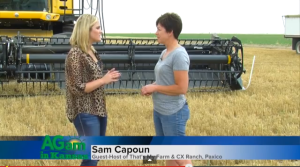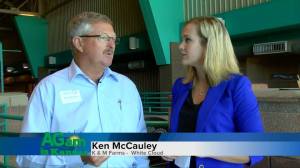This past summer I served as the broadcast intern with Agriculture Today over the K-State Radio Network. This station is based out of Manhattan, Kan.
Agriculture Today is a broadcast show aired every week day at 10 a.m. The show is aired on KFRM 550 and live streamed on K-State Research and Extension wed page. The show, can reach not only to Kansas but surrounding states and with the live stream all across the United States. I work under the main broadcaster, Eric Atkinson.
The main purpose of this broadcast show is to keep producers, farmers, or advocates of agriculture in the know of what research and big things are happening in the world of agriculture. The show covers subjects that are spread all of agriculture from crops to Ag in the Classroom.
For the first couple of weeks it was a quick learning experiences of just learning how to edit material on Adobe Audition and learning how to set up the program to be aired. Although I was just getting my feet wet, within those first few weeks Atkinson ask me to contact someone for my first interview.
I thought that I wasn’t ready for my first experience, but Atkinson thought I was, and of course he was right. Currently I’m now up to doing five to six interviews a week but every time I still get the butterflies.
As the summer went on I had my first traveling experience at 2015 Kansas State FFA Conference. This experience brought a lot of first such as, using a hand held microphone and recorder. Also, I had the pleasure of being back stage during the last session when they announced the new state officers. My purpose of this event was to interview the winners of Kansas Star in Agribusiness and Farmer, and the new state officers. This was a very intense upbeat environment that I wasn’t use to. It ended up being a great experience and it made me realize how much I love broadcasting.
While realizing I liked that experience, at the station, my duties were routine. But I mean routine in the sense of having to conduct interviews. Every interview is different and the interviewee is always different. This internship has taught me many things and one of which is don’t be shy. When I listen to my interview at the beginning of summer compared to the end you can hear how by the end of the summer my interviews started to feel more relaxed and conversational. Every week I have to produce two network pieces that will be placed on the website for stations to use throughout the week. This piece can only be three minutes. Although it sounds easy sometimes it can be and sometimes you get 15 minute interviews that holds a lot of information. This experience taught me to utilize my time correctly.
Throughout the summer I learned many things but the two most important ones were deadlines and time management. In this communications industry time is based on time, wither that being interviews or producing a piece so it’s ready for the next show. Nothing has been more rewarding then having people call me telling me they heard me on the radio and ask me more questions about the interview. It gave me a humbling feeling of significance.
Atkinson has been a great mentor. I have learned so much from him and the staff at Agriculture Today. Atkinson brings a sense of importance and achievement on every broadcast show. Agriculture has a long road ahead of it and its people like him advocating it to help mend it together.

